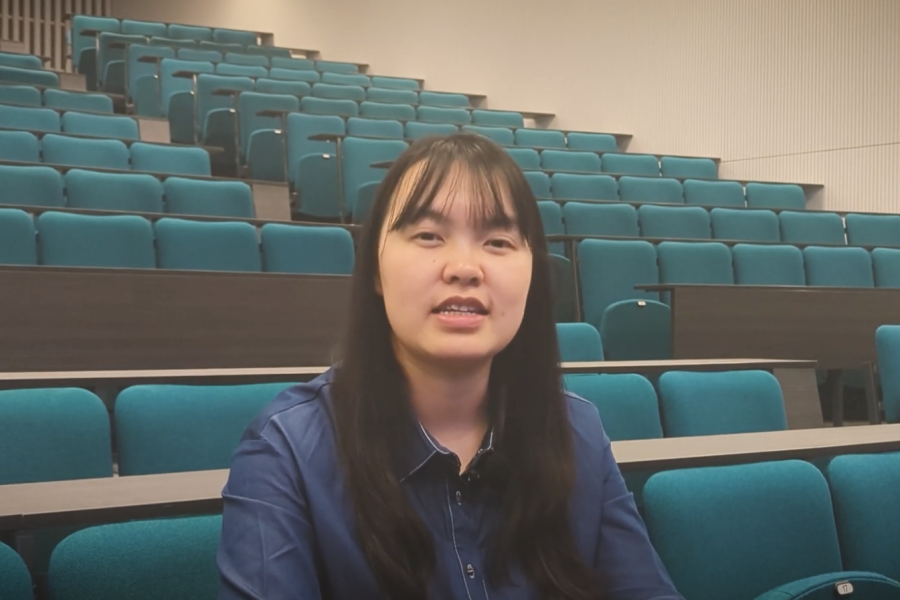About This Course
Data analytics is a growing area within today’s job market with employers increasingly looking for graduates with analytical skills and the ability to understand ‘Big Data’. This course gives you a foundation of knowledge in Business Data Analytics and helps develop your practical abilities to extract, analyse and report on data to support organisational decision-making.
Companies from a wide range of industries are collecting masses of data and are starting to compete on their ability to make use of that data, this is where business data analytic graduates are needed. Analysing data can help businesses solve problems and is highly sought after in industries such as finance, health, business, and marketing. The ability to analyse and interpret data can give businesses a competitive edge by making informed decisions.
‘Big Data’ is changing business and the economy, by studying Business Data Analytics at Bangor University you’ll gain the knowledge and skills to analyse ‘Big Data’ in a variety of business contexts. You’ll learn valuable techniques used by data analysts and develop skills with a variety of tools, algorithms, and models.
This course prepares you to become a strategic manager of data, using core managerial theories paired with practical analytical skills to be able to uncover trends, patterns and support organisational decision-making. There is opportunity to develop and advance your skills through real-life practical projects applying academic knowledge and research skills to address business and organisational issues.
Why choose Bangor for this course?
- We’ve designed this new course to meet the needs of today’s job market, you’ll gain practical and relevant skills that make graduates highly employable.
- Bangor University can provide a distinct offering due to our existing strengths in banking, finance and marketing subjects.
- As a smaller Business School, we’re able to offer students more access and time with academic staff than other institutions.
- Bangor Business School has an excellent research reputation that feeds into our curriculum making our courses current and relevant to the real world.
- Our new trading lab gives students the opportunity to learn more about the financial sector by simulating the stock markets right here in Bangor University.
[0:00] [VISUAL DESCRIPTION: Title "Dr Heather He: Lecturer in Data Science" with University crest and Bangor Business School / Ysgol Busnes Bangor text]
[0:03] Hello I'm Dr Heather He, I'm a lecturer
[0:07] in Data Science and Analytics at Bangor
[0:09] Business School. I teach data analytics
[0:11] for finance and business applications at
[0:14] BBS. One of the best things about
[0:16] teaching here is I can show my students
[0:19] the link between what they are learning
[0:22] and how to make use of it in their daily
[0:26] life and for their Career Development
[0:28] practically. So the topics I teach here
[0:31] are designed to guide and support my
[0:34] students to gain the skills that are
[0:37] highly valued and that are looked after
[0:39] by a wide range of business sectors. Such
[0:43] skills include programming statistical
[0:45] learning and data-driven decision making.
[0:48] The reason I chose to teach at Bangor is
[0:52] it is one of the few institutes that are
[0:55] actively developing and adding this very
[0:58] innovative and exciting subject - Business
[1:01] Data Analytics - to their curriculum. I
[1:04] genuinely believe that what students
[1:07] learn here at BBS will benefit them as
[1:10] the next generation of Business Leaders
[1:13] and entrepreneurs not only for their
[1:16] career development but also for their
[1:18] decision making in their everyday lives.
[1:23] [VISUAL DESCRIPTION: University crest and logo]
Course Content
On this course you’ll learn how to use innovative coding packages used by data scientists, focusing on writing code to solve business problems and real workplace challenges. You’ll gain hands-on practical experience and become familiar with prominent issues in data security, data management and ethics. Students will be equipped to articulate outputs of data scientists and deliver against these expectations. A particular focus will be given to the tools needed to model, store, clean, manipulate, and ultimately extract information from datasets.
Over the years we’ve seen shifts from traditional servers to cloud based solutions, we’ll look at infrastructure and how it plays a big part in data storage. With new technologies comes new security threats, on this Business Data Analytics course we’ll look at the issues of cybersecurity and the ability to implement basic best practices.
Students will learn how to analyse ‘Big Data’, more specifically, mathematical, and practical applications of techniques such as Artificial Neural Networks, Support Vector Machines and Natural Language Processing.
How will you learn?
Teaching is delivered through a combination of lectures, workshops, and seminars. You will also be expected to undertake independent study and group work and take part in online activities and discussions using our virtual learning environment.
What will you study on this course?
In Year 1, students will take credits from topics such as, Business Analytics, Business Analytics Coding, Database Applications in Business and Finance, Discover Economics, Introduction to Contemporary Management Issues in Ethics, Sustainability, HRM, and Tourism and Principles of Management and Organisation.
In Year 2, students will take credits from topics such as, Business Analytics, Business Information Systems, Commercial awareness and insight of work, Data Science, Econometrics, Infrastructure for Data Analytics and Investment and Portfolio Management.
In Year 3, students will take credits from topics such as, Advanced Econometrics, Applied Machine Learning, Consultancy Project, FinTech in banking, finance, investment, insurance and regulation, International Business & Global Competency and Strategic Management.
Please note course content is for guidance purposes only and may be subject to change.
Facilities
Databases
Here at the Business School, we have access to some of the best databases, including Bloomberg. Allowing students to use these databases as part of their course improves their learning experience and better prepares them for a career in industry.
Bloomberg Professional
Bloomberg Professional is a global financial database that provdides current and historical data on individual equities, stock market indices, fixed-income securities, currencies, commodities, and futures across both international and domestic markets. It offers in-depth insights into more than 5 million bonds, equities, commodities, currencies, and funds. Users can easily access and download data using an Excel add-in or API. There are daily and monthly limitations on the number of observations that can be downloaded.
Boardex
BoardEx is a comprehensive international corporate governance database that offers online search and analysis facilities focused on the dynamics of company boards. It delivers detailed current and historical biographical information on board members and senior executives, encompassing over 15,000 quoted companies globally. This comprehensive platform also provides insights into board committees, compensation, company details, networking features for both companies, directors and job announcements.
S&P Capital IQ Pro
S&P Capital IQ Pro (previously known as S&P Global Market Intelligence and SNL Financial) offers comprehensive bank and firm data spanning the Americas, Asia-Pacific, Europe, Middle East, and Africa. As of 2023, S&P Capital IQ Pro expanded its range to include firm fundamentals, credit ratings, debt choices, and market research. This platform not only offers insights into the broad universe of companies from S&P Capital IQ but also expands the coverage of small and medium enterprises (SMEs). With S&P Capital IQ Pro, users can access current and historical financial data and news for over 50,000 banks globally. This data can be downloaded using an Excel add-in.
S&P Capital IQ
S&P Capital IQ is a comprehensive platform that provides deep global company insights, credit ratings, and market research with robust tools for risk assessment. It provides comprehensive information of companies, markets, transactions, and professionals across the globe. Specifically, Capital IQ delivers: Global company data, including fundamental financials, fixed income, estimates, and ownership details. Qualitative data that highlights key developments, transactions, profiles, individual associations, private equity; and a comprehensive spectrum of macroeconomic and commodity data. This synergy of information makes it an indispensable tool for industry professionals. This data can be downloaded using an Excel add-in.
S&P RatingsDirect
Current and historical credit ratings include public finance coverage from 2007, global issuers, and structured finance from 1922.
Refinitiv Eikon (inc Datastream)
Refinitiv Workspace, part of Thomson Reuters, is a comprehensive platform for financial and economic insights. It provides market quotes, earnings estimates, financial fundamentals, press releases, transaction data, corporate filings, ownership profiles, and in-depth research. Eikon/Datastream offers rich data for international companies, tracing back to the 1960s. Features and data from Thomson Reuters, previously accessed through Thomson One - like mergers and acquisitions, loan data, ownership details, and private equity - can be found in Refinitiv Workspace. Data can be downloaded via an Excel add-in.
Orbis Bank Focus
Orbis Bank Focus, provided by Bureau van Dijk, is a comprehensive database of banks globally. Its data is compiled from a mix of annual reports, varied information providers, and authoritative regulatory sources. At present, Orbis Bank Focus boasts detailed data on more than 38,000 banks — encompassing around 30,000 from the US and over 10,000 from outside the US. For banks that are listed, a historical record spanning 5 years is provided, while unlisted banks have data covering the past 3 years.
Business Source Premier
Full text coverage of nearly 7,600 business publications, including full text coverage of over 1,100 peer-reviewed, scholarly journals. Coverage back to 1922 in some cases.
Emerald Insight
Emerald Insight provides abstracts and full text articles from academic journals covering the subject areas of marketing, management, human resources, commercial music, quality, economics, information management, operations, engineering, production and property, education, health and social care.
Financial Times
News, analysis and comment from the online edition of the world’s leading global business publication
Gale-Business Insights
Interactive tools and in-depth analysis of the history, performance, and opportunities of thousands of companies and industries. Students will find trusted information from premium sources including market research, case studies, SWOT analyses, investment and financial reports, as well as articles from top magazines and industry journals.
IBIS World
comprehensive industry-market research database which covers every US industry with a 5-digit NAICS code. IBISWorld offers also similarly detailed research on selected industries in China and worldwide.
Mintel Oxygen
UK market research providing analysis for a wide range of consumer products (food, drink, household, health, electronics), leisure trends, financial services and retailing.
Lexis
This database includes full-text case-law and legislation for the UK, US (Federal and State), EU and other jurisdictions. It also provides access to a large number of full-text legal journals, and local and national UK newspapers. Includes Halsburys Laws of England.
UK Parliament: Research Briefings
The database continuously produces in-depth and impartial reports which are published as briefing papers on the Parliament website.
Westlaw
Covers the Legal Journals Index, the Current Law indexes, all acts in force from 1267 onwards and statutory instruments from 1949, together with UK cases and an increasing number of full-text journals and books. The American part of the database contains many full-text journals.
Orbis Europe
Orbis Europe, a subset of Bureau van Dijk’s global 'Orbis', is a comprehensive platform tailored to analyse and compare both quoted and private companies across Europe. Encompassing data from 56 European countries, it provides detailed information on public and private banks, insurance, and industrial companies. With over 105 million companies catalogued and weekly updates, this resource offers expansive corporate ownership structures and comparability features. Users can research, analyse, and strategically compile lists of companies through an array of search criteria, including line items from financial filings.
General University Facilities
Library and Archive Services
Our four libraries provide a range of attractive study environments including collaborative work areas, meeting rooms and silent study spaces.
We have an extensive collection of books and journals and many of the journals are available online in full-text format.
We house one of the largest university-based archives not only in Wales, but also the UK. Allied to the Archives is the Special Collections of rare printed books.
Learning Resources
There is a range of learning resources available, supported by experienced staff, to help you in your studies.
The University’s IT Services provides computing, media and reprographics facilities and services including:
- Over 1,150 computers for students, with some PC rooms open 24 hours a day
- Blackboard, a commercial Virtual Learning Environment, that makes learning materials available on-line.
Course Costs
General University Costs
Home (UK) students
- The cost of a full-time undergraduate course is £9,000 per year (2021/22 entry and 2022/23 entry).
- The fee for all placement, international, and sandwich years is £1,350 (2021/22 and 2022/23).
- More information on fees and finance for Home (UK) students.
International (including EU) students
Additional Costs
There are also some common additional costs that are likely to arise for students on all courses, for example:
- If you choose to study abroad or take the International Experience Year as part of your course.
- If you attend your Graduation Ceremony, there will be a cost for gown hire (£25-£75) and cost for additional guest tickets (c.£12 each).
Course-specific additional costs
Depending on the course you are studying, there may be additional course-specific costs that you will be required to meet. These fall into three categories:
- Mandatory Costs: these are related to a particular core or compulsory module that you’ll be required to complete to achieve your qualification e.g. compulsory field trips, uniforms for students on placement, DBS Check.
- Necessarily Incurred Costs: these may not be experienced by all students, and will vary depending on the course e.g. professional body membership, travel to placements, specialist software, personal safety equipment.
- Optional Costs: these depend on your choice of modules or activity and they are shown to give you an indication of the optional costs that may arise to make sure your choice is as informed as possible. These can include graduation events for your course, optional field trips, Welcome Week trips.
Entry Requirements
GCSE Maths at grade C/4 required if not demonstrated by the Level 3 qualification.
Offers are tariff based, 104 - 136 tariff points from a Level 3 qualification* e.g.:
- A Levels: General Studies and Key Skills not normally accepted
- BTEC National Extended Diploma: DMM - DDD
- Cambridge Technical Extended Diploma: DMM - DDD
- International Baccalaureate Diploma: accepted
- Access: pass required
- Welsh Baccalaureate: We will accept this qualification in conjunction with other level 3 qualifications
- T Levels: T Levels in a relevant subject considered on a case-by-case basis
- Extended Project Qualification: Points can include a relevant Extended Project (EPQ) but must include a minimum 2 full A-levels, or equivalent.
We are happy to accept combinations of the qualifications listed above, as well as alternative Level 3 qualifications such as City & Guilds, Access and Cambridge Technical Diplomas.
We also welcome applications from mature learners.
International Candidates: International Candidates: school leaving qualifications that are equivalent to A levels/Level 3 and/or college diplomas are accepted from countries worldwide (subject to minimum English Language requirements). More information can be found on our International pages.
*For a full list of accepted Level 3 qualifications, go to www.ucas.com.
General University Requirements
To study for a degree, you’ll be asked for a minimum of UCAS Tariff points. For a fuller explanation of the UCAS Tariff Points, please see www.ucas.com.
We accept students with a wide range of qualifications and backgrounds and consider each application individually.
All students need to have good basic skills and the University also values IT and communication skills.
As part of the University’s policy, we consider applications from prospective disabled students on the same grounds as all other students.
We also consider applications from mature students who can demonstrate the motivation and commitment to study a university programme. Each year we enrol a significant number of mature students. For more information about studying as a mature student, see our Studying at Bangor section of the website.
EU and International Students' Entry Requirements
For detailed guidance on the entry requirements for EU and International Students, including the minimum English Language entry requirement, please visit the Entry Requirements by Country pages. International applicants can also visit the International Education Centre section of our website for further details.
Bangor University offers International Incorporated Bachelor Degrees for International students whose High School qualification is not equivalent to the UK school leaving qualification. The first year (or Year 0) is studied at Bangor University International College, an embedded College on our University campus and delivered by Oxford International Education Group.
Careers
On graduating, students are equipped with the skills and knowledge needed for a successful career in industry or academia. There is a huge demand for business data analyst, with a strong demand here in the UK. Students can gain employment in industries such as business, finance, marketing, health, government, telecommunications, the media, and manufacturing.
Skills you’ll learn on this course:
- Decision making skills
- Analytical skills – ability to present informed and evidence-based data
- Communication – the ability to talk and present to a range of audiences
- Management – the ability to make informed decisions and lead change
- Multitasking – ability to work on multiple projects/tasks
- Time management – ability to complete projects to a timeframe.
Typical career paths associated with this degree are:
- data analyst
- quantitative analyst
- data scientist
- data consultant
- business intelligence analyst
- systems analyst
- enterprise analyst
- business architect
- project manager
- data security management
- management consultant
- process analyst
- product manager
- data architect
- data consultancy
- business consultancy.
Opportunities at Bangor
The University’s Careers and Employability Service provides a wide range of resources to help you achieve your graduate ambitions.
The Bangor Employability Award (BEA)
The BEA is a comprehensive online course that you can work through at your own pace, taking you through all the steps you need to take to explore, prepare and apply for your dream career.
Internships
Bangor University runs a paid internship scheme within the university’s academic and service departments.
Student Volunteering
Volunteering widens your experience and improves your employability. Find out more about volunteering on the Students’ Union’s website.






